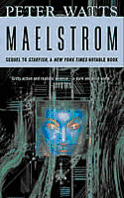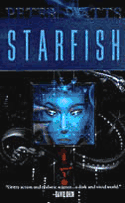  | ||||
HOME |
A Chat with 
According to Peter Watts' website, he "has a bunch of degrees in marine biology, which should add authority to a book like Starfish [1999]. The bad news is that he got all of them studying marine mammals; the only place his expertise gets a chance to shine through is in Chapter 2, where a dead and rotting beaked whale drops into the narrative with a soggy thud. Even here, dramatic constraints forced Watts to get the details wrong. "Watts has spent much of his adult life trying to decide whether to be a writer or a scientist, ending up as a marginal hybrid of both. He's won a handful of awards in fields as diverse as marine mammal science, video documentary, and science fiction. These accolades have not gone to his head since they never involved a lot of cash. "Throughout the past decade he has been paid by the animal welfare movement to defend marine mammals; by the US fishing industry to sell them out; and by the Canadian government to ignore them. He eventually decided that since he was fictionalising science anyway, he might as well add some characters and plot and try selling to a wider market than the Journal of Theoretical Biology." Peter is a fiction editor of On Spec magazine, and a semi-willing denizen of Toronto. He was interviewed via e-mail in early June, 2001 prior to his lecture at the June 17 Open Meeting. The title of your 2000 fiction collection Ten Monkeys, Ten Minutes is a "reference to the time and the number of randomly typing simians it would take to generate fiction of equal calibre," your site says. Why so self-deprecating about your work? It's good. Well, thanks, but the false modesty is only part of it. That title also reflects an underlying theme that regularly shows up in my work: that we use our big honking neocortices not to control our instincts, but to make excuses for them. I'm repeatedly struck by how often we invoke "God" or "family" or "democracy" to justify behaviours which are pretty much identical to those of sticklebacks and orb-weaving spiders. And for pretty much the same self-serving, turf-and-mate-guarding reasons. Our brain stems are still, for the most part, running the show; we're all just monkeys under the skin. Originally there were ten stories planned for the collection—before my editor told me that one of them sucked—so the "Ten Monkeys" resonated nicely. I should also cop to having ripped off the phrase from a Dilbert cartoon. I understand you've written a sequel, Hydra, to your 1999 novel Starfish, and it's coming out this year. What ideas did you explore in it?
Or, if you'd prefer, it's the continuing story of Lenie Clarke, Ken Lubin, and a family of pet microbes which threaten to end life as we know it. Has any scientific research done since Starfish contradicted some of its content? Not so much scientific as social. I'd envisioned deep-sea submarine eco-tours for rich old yuppies, and set them a few decades in the future, for example—only to see them advertised in real life just as the book was coming out. Along the same the lines, Maelstrom describes an Internet which has evolved into a massive seething ecosystem in its own right, with species assemblages, weather systems, the works. And that's already old news—you can get "Internet weather reports" off the Web as we speak.
What's the latest on your computer-game project for Vancouver's Relic Entertainment? You say it's "not a sexual-abuse-victim roleplaying game based on Starfish." What is it instead? I'm allowed to say now, because they announced it last month [May 2001] at E3 in LA. I'm writing the script for the sequel to "Homeworld," which was a truly breakthrough kick-ass game back in 1999—won a bunch of best-of-year awards, had a radical three-d engine, music ranging from medieval chorales to a track by Yes—oh yeah, and it had kind of a plot, too. The sequel's got more of one—that's all I can say at this point. Tell me about Cuddly Vermin of the Sea. Cuddly Vermin of the Sea is a nonfiction book that's perpetually in development until I can get anybody actually interested in the damn thing. I spent about fifteen years in the marine mammal field, where politics is paramount; the only people interested in funding that kind of work are those with vested interests. If astronomy is "pure" research (driven by scientific curiosity) and genetics is "applied" research (driven by the profit motive), then marine mammal biology is "whore" research (whoever pays expects you to come up with results that support their own party line). The johns generally come in two flavours: the animal rights/conservation/welfare community (the "Cuddly" part of the title), and commercial fishing interests who see whales and seals as competitors or consumables (the "Vermin" aspect). Both sides manipulate the truth for their own ends. Those of us who just want to follow the data wherever they lead are continually frustrated by this. I've worked for both sides, both in terms of research and education, and I think it sucks (although forced to choose, I'd ally myself with the conservationists in a heartbeat). Cuddy Vermin of the Sea would be my insider's view of marine mammal biology in Canada—the archetypal whore science. You can see why publishers aren't exactly falling over themselves in their eagerness to embrace this property. What would enable you to flee Toronto for Vancouver, where you'd rather be? Lots of money. Or a moderate amount of money, coupled with some long-term security; I'm making a pretty good living as a writer right now, but of course if the next book tanks I could be dumpster-diving in two years. Actually, the whole Toronto/Vancouver thing is more ambiguous than I've made it seem. My partner's a Toronto resident, which is why I moved out here in the first place (the first time in my life that I actually moved across the country to get closer to a relationship, which is some kind of record, I guess). And Toronto's a pretty cool place in many ways. But it doesn't nestle between a beautiful ocean and a glorious mountain range; it sort of shudders between a goofball mayor and a tyrannical premier. Or between Hamilton Harbour and the Pickering nuclear plant. On the other hand, TO's the only place in North America where you could see R.E.M. [the band] live this year. And it was free. Can't beat that. What else are you working on/thinking about? There's a final rifter book in the works, called Behemoth. But my next novel is a first-contact piece that fools around with the nature of consciousness, and why in Darwin's name it would actually be necessary. From an evolutionary perspective, self-awareness makes no sense; you can imagine natural selection producing an intelligent automaton smart enough pull its hand back from a hot stove without having to experience the subjective sensation of blinding pain that we experience first. Such an automaton would be at a selective advantage; I mean, sure, pain tells us something's wrong but it also hurts, and that distracts us from the business of survival. So what if this whole personal-sentience thing is a maladaptive fluke, present on earth but not elsewhere? What if your standard intelligent, starfaring technological race is in fact nonsentient? That's the thread I'm exploring now. The cast includes someone with deliberately-induced multiple-personality disorder, and a vampire. But a rigorously-described, evolutionarily plausible vampire. Yeah, well, don't judge before you see the finished product... There may also be some new computer-game projects in the works. Or maybe not. Too early to tell for sure. Also on this site: Peter's lecture at the June 16, 2001 meeting. | |||
Interviews, Speeches, Articles | Voyageur Home Upcoming Events & Conventions | Club History Main Site Editor & Site Problems IDIC Home Copyright © 2001, Infinite Diversity International Corporation. All rights reserved. | ||||
 Actually, the official title is Maelstrom (after a series of working titles including Hydra, Chimera, Anemone, Man-o-war, and Piece-o-crap—that self-deprecation thing comes easy after the fifth draft). It's got a fair number of diverse themes, actually—it's more of an "idea" book than Starfish was. Scientifically, it's an exploration of life as a function of entropy and information theory; philosophically it's a riff on the nature of free will (such as it is); morally it's an ode to the healing power of revenge. All against the backdrop of a post-information society falling apart at the seams, where the Collective Unconcious has developed a death wish and the pre-eminent world power is a sovereign Quebec. Seriously.
Actually, the official title is Maelstrom (after a series of working titles including Hydra, Chimera, Anemone, Man-o-war, and Piece-o-crap—that self-deprecation thing comes easy after the fifth draft). It's got a fair number of diverse themes, actually—it's more of an "idea" book than Starfish was. Scientifically, it's an exploration of life as a function of entropy and information theory; philosophically it's a riff on the nature of free will (such as it is); morally it's an ode to the healing power of revenge. All against the backdrop of a post-information society falling apart at the seams, where the Collective Unconcious has developed a death wish and the pre-eminent world power is a sovereign Quebec. Seriously. Taking a step back, though, I'd be willing to bet that a fair bit of scientific research done before Starfish contradicts it. I had to keep re-locating Beebe Station to keep ahead of the curve; when I started writing the book, hardly anyone had seen a hydrothermal vent with their own eyes. By the time I finished there were monthly research cruises criss-crossing the Juan-de-Fuca Ridge. They've got everything down there but a Starbucks concession, and so far, no swarms of giant mesopelagic vertebrates. Finally I just gave up and invented a little rift vent; I stuck it at some distance from current real-world research routes, so hopefully it'll be a while before some smart-ass goes down there and proves me wrong.
Taking a step back, though, I'd be willing to bet that a fair bit of scientific research done before Starfish contradicts it. I had to keep re-locating Beebe Station to keep ahead of the curve; when I started writing the book, hardly anyone had seen a hydrothermal vent with their own eyes. By the time I finished there were monthly research cruises criss-crossing the Juan-de-Fuca Ridge. They've got everything down there but a Starbucks concession, and so far, no swarms of giant mesopelagic vertebrates. Finally I just gave up and invented a little rift vent; I stuck it at some distance from current real-world research routes, so hopefully it'll be a while before some smart-ass goes down there and proves me wrong.